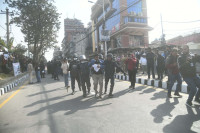Opinion
All eyes on the NRA
The Reconstruction Authority has slid back into oblivion after the CEO’s appointment
Bhojraj Poudel
The country’s top leaders were passionately engaged in appointing the Chief Executive Officer (CEO) of the National Reconstruction Authority (NRA) for nine months, but they have not been as enthusiastic about doing the actual work of rebuilding. Earthquake victims are suffering from cold and rising prices of essential goods due to an unofficial Indian blockade. Schools are performing below standard and children are forced to attend classes in classrooms damaged by the tremors. Civil servants are not keen on joining the NRA, and there is a danger that management issues might overshadow its assigned task.
Unfortunately, the fate of the earthquake victims is linked to that of the NRA. It is necessary to keep the institution away from political manoeuvring so that it can deliver quality work by recruiting a quality workforce through a competitive selection process. The first meeting of the advisory committee held in Baluwatar might have been a bad experience for the NRA’s CEO Sushil Gyawali due to the very strong opposing voices. The only way to quieten them is to deliver quality work. Moving forward with reconstruction is key to bringing the pledged aid money from various development partners. A number of countries and development partners such as the Asian Development Bank (ADB) and the World Bank promised more than $4.4 billion for reconstruction and rehabilitation at the International Conference on Nepal’s Reconstruction 2015. Politicising the institution can lead to the hiring of a low quality workforce from the parties’ cadre base and underperformance, which might result in a reduced flow of aid money.
Long-term impact
The failure of the NRA will not be just another failure in the series of failures of institutions. The failure to reconstruct the infrastructure destroyed by the killer quake will have long-term effects on the nation’s economy and human capital development. More than 30,000 classrooms have been destroyed, affecting the education of hundreds of thousands of students besides creating psychological terror among the children. The agricultural cycle has been affected and the economic growth rate has shrunk as a result. The NRA’s failure and delayed reconstruction will be a grievous blow to the people who are already reeling under the cycle of poverty.
The NRA can kill two birds with one stone by, one, being an example of a sound and efficient institution and even setting the trend for existing institutions; and, two, carrying out the reconstruction work at full speed and helping to accelerate the rate of economic growth. In order to do that, it should pursue an uncompromising attitude with regard to recruiting a quality workforce that will travel the extra mile to achieve the goal. Putting together a team of professionals will not only bring efficiency in the task of rebuilding, but also show the development partners that their money is being well spent. The NRA can form a panel of professionals from diverse sectors such as economists, engineers and others to select the required staff so that there will be no political manipulation.
Carefully navigating through the interests of various sectors and managing the resources that come in the name of the victims are challenging tasks. The NRA has begun to outsource the work of surveying and monitoring earthquake damage to non-governmental organisations (NGOs) which has drawn public criticism. NGOs should be allowed to work in reconstruction and rehabilitation, but the NRA should not be involved in their business. The authority has been assigned to perform a bigger task of bringing the pledged money from development partners, directing it to the right places and ensuring the quality of reconstruction projects. It should be more involved in mobilising the government mechanism and getting professionals to fill in the gaps. Bringing NGOs on board to carry out the task of reconstruction goes against the government’s appeal to development partners to channel aid money only through its mechanism.
The NRA does not have a favourable work environment. There are challenges even beyond the nation’s undisciplined bureaucracy and political turmoil. India’s disappointment with Nepal’s ruling elite, inflated importance given to the China-India rivalry in Nepal and the indifference of the international community are also impediments for the NRA. But these factors are what make this institution so important. The level of success will be determined by the quality of the human resources it can put together. For the government no task is as important as providing relief to the earthquake survivors. Improving governance, tackling corruption and implementing the newly promulgated constitution are all secondary compared to the task of reconstruction and rehabilitation. The NRA is the institution through which the government has to carry out this most important task. Hence, the relationship between the government and the NRA is symbiotic. The government should help the NRA to work as professionally as possible to make a name in history.
Get to work
There is no guarantee that the pledged aid money will arrive. If the NRA fails to make progress, it may not come at all. And this will make the political parties very unhappy since they have expended so much effort to get their people appointed as its head because so much money is at stake. The economic benefits that the political parties saw in having their man at the NRA’s helm might not materialise if they prevent him from steering the institution professionally. An energy deficit, fuel crisis, shortage of construction materials, rising inflation, unfavourable political environment and other daunting challenges hinder the implementation of the reconstruction project. The NRA should be prepared to address these challenges. The very idea behind the formation of this new institution is to carry out reconstruction amid the difficulties the country is presently facing.
The emergency assistance programmes designed by Nepal’s development partners have been in limbo due to the absence of an institution to coordinate with them.
The NRA believes that it will be effective in facilitating the projects and programmes without delays and bureaucratic hassles. The earthquake victims are the ones most anxious to see the reconstruction work being implemented speedily. The NRA should not let these people down. The social and economic costs of a malfunctioning authority will be severe in the country that has already suffered so much.
Poudel is an economist associated with ThinkIN China




 20.12°C Kathmandu
20.12°C Kathmandu










